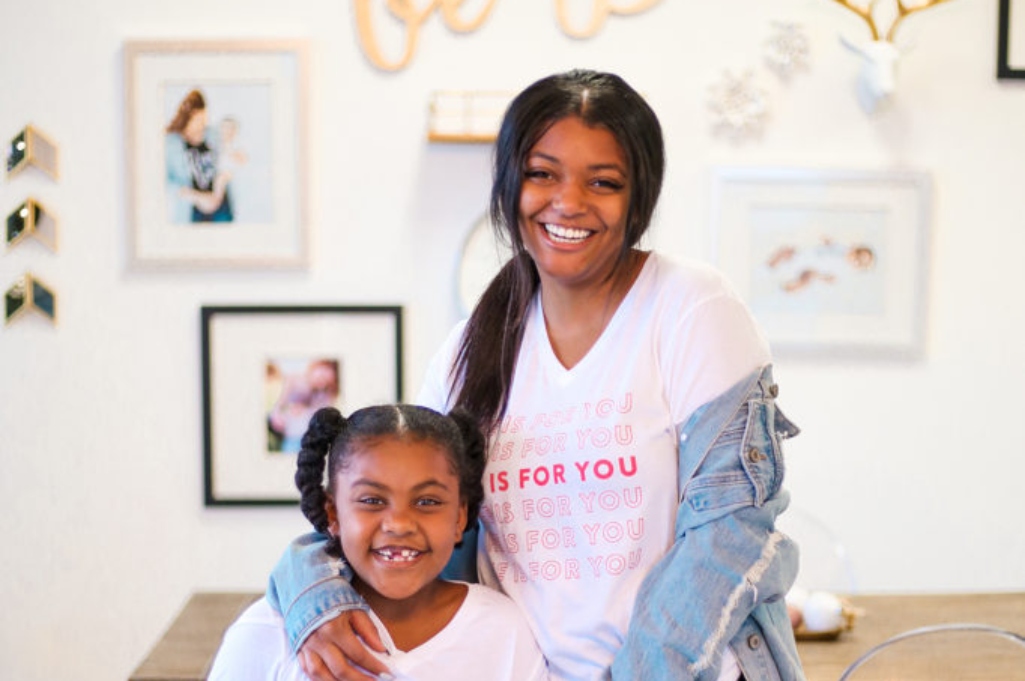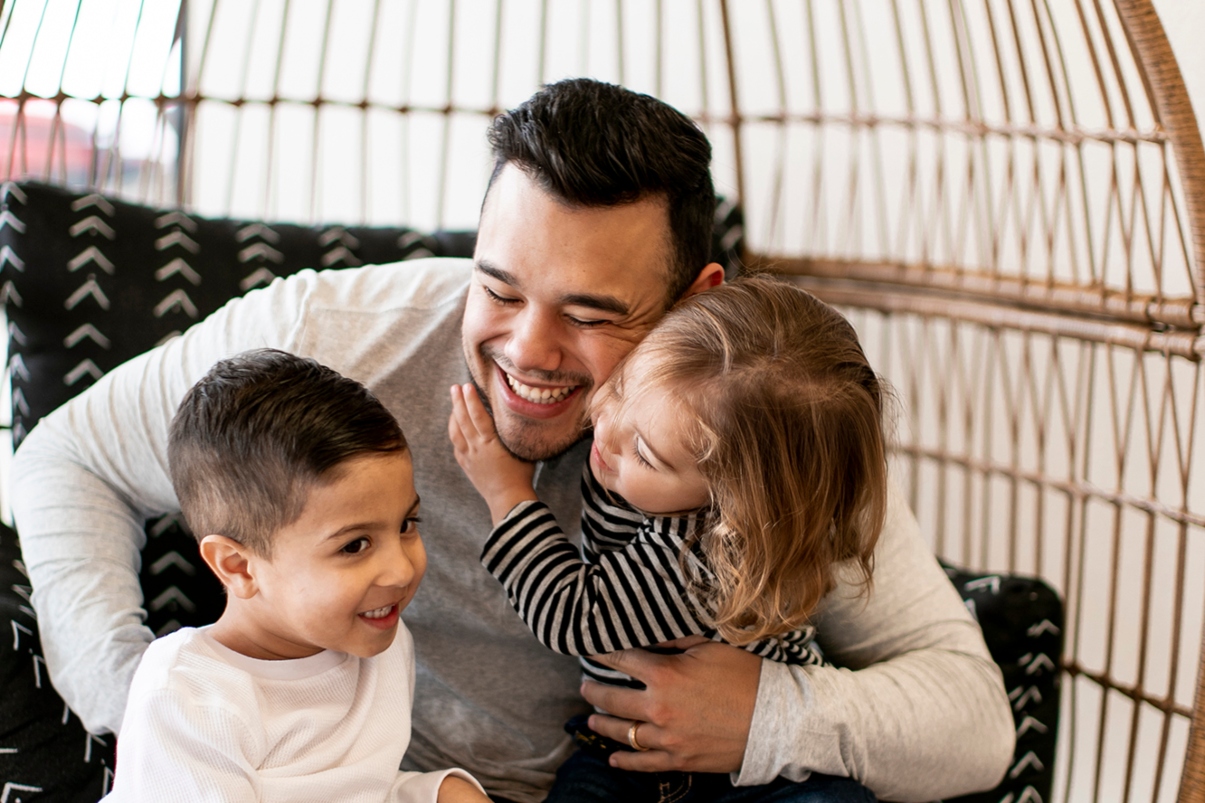
An Embrace Grace alumna and her daughter visit the ministry’s national headquarters in Hurst, Texas.
Unmarried mother Lila DiBias was afraid and ashamed. She’d become pregnant just a month before the COVID-19 pandemic and hadn’t been able to attend church when she needed it most.
Her son John was 7 months old when she returned to Fruit Cove Baptist Church. That’s when she learned of Embrace Grace, an international Christian ministry for single women facing unplanned motherhood and single men facing fatherhood.
DiBias found a friend in Fruit Cove’s Embrace Grace leader Windy Keene, a married mother who had been single and pregnant decades earlier at 17.
“She changed my life,” DiBias said of Keene, “and I truly wouldn’t be in the place that I’m in now if it weren’t for her, because she just showed me the grace of God, quite literally.
“The more she learned about me and my situation and my son, the more I learned about her and I realized how passionate she was about this group and helping the girls, and how big of a love for God that she had in wanting to tell us that He just wanted to love us with open arms, not just them and the leaders.”
Keene sees a responsibility for the church as a whole in responding to the needs of mothers as well as the unborn.
“As a church we are really great at being anti-abortion. Women are abortion-minded because of life’s uncertainties or their situation. When they choose life all of those fears and anxieties come to fruition,” Keene said. “As a church we have to make sure that we’re coming alongside them. We can’t just be pro-life; we have to be pro-love. And programs like Embrace Grace help the church to facilitate just that.”
Florida ranks fifth among U.S. states with the highest abortion rates, suffering 20.6 abortions per 1,000 women ages 15-44 years old in 2014, according to the Guttmacher Institute. That same year, 17% of women receiving abortions described themselves as mainline Protestant, 13% as evangelical Protestant; 24%, Catholic and 38%, no religious affiliation, Guttmacher reported.
Christina Crowder, who leads Embrace Grace at Normandy Park Baptist Church in Jacksonville, faced an unplanned pregnancy decades ago while single and 21.
Her church and parents were supportive, Crowder said, but no one assured her of God’s faithful love.
“I didn’t have what Embrace Grace teaches these young ladies about God’s love,” Crowder said. “I knew that I was loved, but I guess I wasn’t instructed that I was loved even though I was single and pregnant.”
Her child’s father wanted her to have an abortion, and deserted her when she refused.
“Looking back, I wonder ‘Why did I have to go through all this?’,” said Crowder, now a widowed mother of two, the oldest her 36-year-old son. “And I think, even 35 years later, the Lord is using me to minister to other girls because of what I experienced. And the ministry is great, it really is.”
Embrace Grace co-founder and president Amy Ford understands the plight of unwed mothers. She has been married 23 years to her “high school sweetheart” Ryan, the father of the child the two considered aborting when Ford was 19.
At that time, abortion seemed a quick fix. She scheduled the abortion, went to the clinic and paid for the procedure.
“When I went in and they were telling me how they were going to do the procedure I ended up hyperventilating and passing out in the abortion room,” Ford said. “And when I came to, the nurses were fanning me and trying to get me enough water, and one of the nurses said, ‘You’re too emotionally distraught to make this decision today. You can come back another day, but today you are not getting an abortion.’”
She and Ryan decided to keep their son, now 23-year-old Jess, and prepared for the disappointment they expected from their parents.
“We decided to get married because we knew we wanted to get married someday, not necessarily in this order, but we had decided to get married when I was 16 weeks pregnant.”
Ryan asked a pastor who earlier led him to the Lord to perform the ceremony, but the pastor refused, citing Ryan’s and Amy’s sin.
“We were like, ‘Oh my gosh, we are such horrible people. We can’t even get married and be blessed.’” They found another pastor to perform the nuptials. “We got married and it definitely was a beautiful wedding, but felt like a scarlet letter on our wedding day.”
Realizing the power of the church, Ford surmised how her experience might have been different had she consulted a church instead of an abortion clinic. What if she had sought prayer for wisdom, guidance and support from the church before going to the abortion clinic. After all, she was a weekly worshiper.
“But because of the way the church was structured, plus because no one ever really talked to me about this issue, plus with my own shame, all of those combined,” Ford said, “it was the last place I wanted to go to.
“We want to change that and we want the church to be one of the first places a girl runs to in that situation instead of the last, because of shame and guilt. So we (she and Ryan) started Embrace Grace.”
Two years after the Fords were married, the pastor who had refused to perform their wedding called and apologized, and recemented his mentorship of Ryan. Eventually, he apologized to Ford and to Jess for rejecting him while he was yet in his mother’s womb.
Ford calls Embrace Grace a pro-love movement.
“We believe pro-life is a stance, it’s a belief system,” she said, “but pro-love is the action.” Even with the advent of the latest abortion legislation in Texas that prevents abortions past six weeks of incubation, Ford said, many churches have done nothing to help mothers who may now carry their babies to term unless they seek procedures out-of-state.
“As the church, we have to not only vote a certain way,” she said, “we have to be the church in this situation and welcome these girls in, and say we’re going to walk with you, and no single mom should have to walk alone.”
DiBias describes the unexpected open arms she experienced when she began attending Embrace Grace at Fruit Cove Baptist.
“The welcome arms I received was just overwhelming. Going to church and being in the kind of situation that I and the other girls had been in, open arms is not the first thing that really comes to mind,” DiBias said. “Windy and the other group leaders that did welcome us with open arms truly were life changers for not just me, but all of us.
“I think more of us would be there if we didn’t feel so scared by the church. And I don’t believe it should be that way; it is, unfortunately, because you can’t control what people are going to think or what they’re going to say. That in itself is probably the biggest fear for pregnant girls, in a relationship or out of a relationship.”
Women learn of Embrace Grace support groups through the Love Boxes the ministry leaves at pregnancy care centers for patients, and are sometimes referred through word-of-mouth. At least 454 pregnancy care centers have participated since Embrace Grace was founded, distributing the boxes featuring a letter of hope, a journal and such gifts as onesies and a motivational book featuring testimonies from other single mothers.
Many are benefitting from and mentoring others through Embrace Grace, a ministry with nearly 700 support groups in 49 states and 10 international countries. Embrace Legacy, the support groups launched in March for men, has about 40 groups in the U.S., Embrace Grace told Baptist Press.
The ministry is designed for easy implementation in churches of various denominations. Ford is a member of Gateway Church, the nondenominational megachurch founded by Robert Morris in the Dallas/Fort Worth area.
To start a group, pastors sign an agreement form to conduct the ministry at church. Embrace Grace sends the curriculum and digital training. The only costs to churches are printed materials and class accessories, with costs averaging $30 per participant in the average class size of 5. If churches are unable to cover the costs, materials are provided at no charge.
“We wanted to make it as simple as possible administratively, so that each leader can have the most time to build relationships with these moms,” Ford said. “It’s a really powerful curriculum. It’s not over their heads, but yet, we know that there’s healing that’s happening in their hearts, and changing the way they think, and helping them know about God’s Word, and even their identity and their value and their worth in Jesus.”
(EDITOR’S NOTE – Jan. 16 is Sanctity of Human Life Sunday in the SBC. Resources for churches are available here. Diana Chandler is Baptist Press’ senior writer.)



